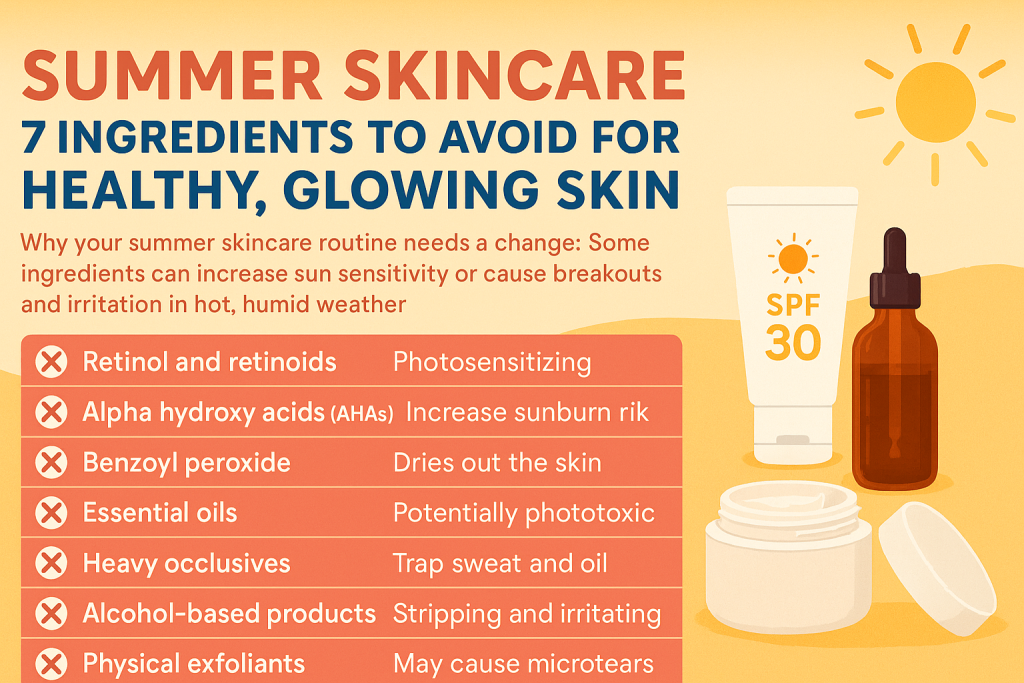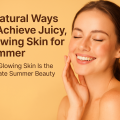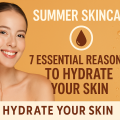Summer Skincare: 7 Ingredients to Avoid for Healthy, Glowing Skin
Why Your Summer Skincare Routine Needs a Change
With rising temperatures, longer days, and stronger sun exposure, summer presents unique challenges for your skin. What works perfectly in winter or spring might trigger irritation, breakouts, or increased sun sensitivity in the heat. That’s why understanding which skincare ingredients to avoid in summer is essential for maintaining a clear, radiant complexion.
The increased humidity, perspiration, and exposure to UV rays can interact with certain ingredients in surprising—and sometimes damaging—ways. Adjusting your regimen can prevent problems like photosensitivity, clogged pores, and dehydration, helping you enjoy summer with confidence.
Below, we reveal the top 7 ingredients you should avoid in your summer skincare routine, along with practical alternatives and expert tips to keep your skin healthy all season long.
1. Retinol and Retinoids: Powerful but Photosensitizing
What Are Retinoids?
Retinoids, including over-the-counter retinol and prescription-strength tretinoin, are vitamin A derivatives prized for their ability to speed up cell turnover, fight acne, and reduce wrinkles. However, they also thin the top layer of your skin, making it more vulnerable to UV damage.
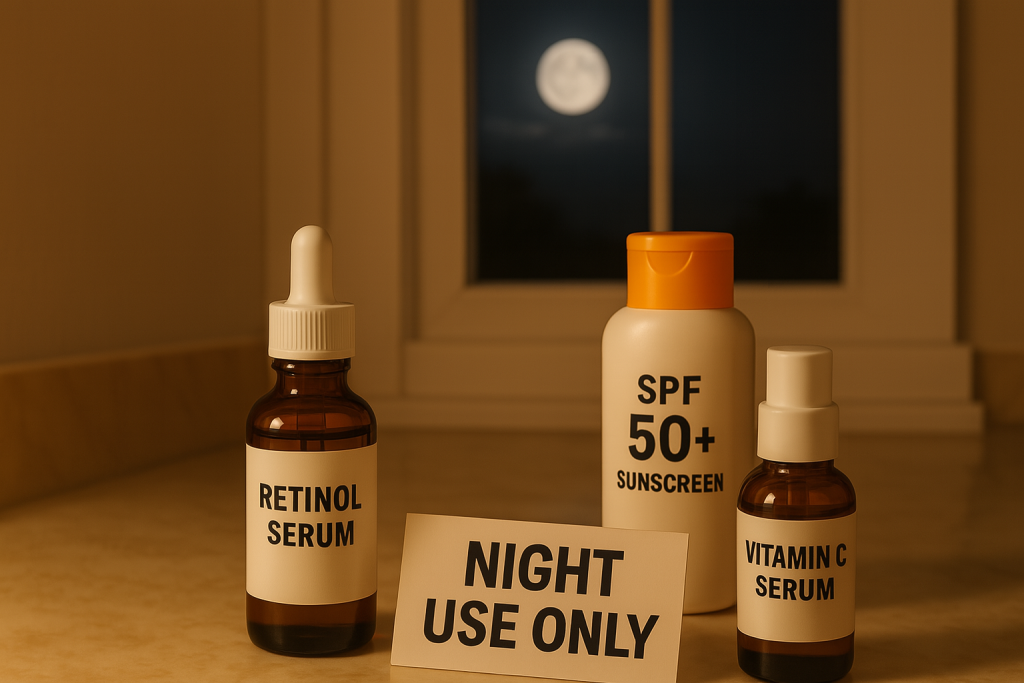
Why Avoid Retinoids in Summer?
Using retinoids in summer can lead to increased risk of sunburn, hyperpigmentation, and irritation. Even diligent sunscreen users may experience sensitivity, redness, or peeling from the combined effects of retinoids and sun exposure. According to dermatologists, retinoids can also break down more quickly in sunlight, reducing their effectiveness.
Summer Skincare Tip
- If you must use retinoids, apply them only at night.
- Always pair with a broad-spectrum SPF 50+ and consider taking a break during vacations or outdoor activities.
- Try antioxidants like vitamin C or niacinamide as gentler alternatives for summer skin renewal.
2. Alpha Hydroxy Acids (AHAs): Exfoliation with a Downside
The Appeal and the Risk
Alpha Hydroxy Acids (such as glycolic, lactic, and mandelic acids) are effective exfoliants that remove dead cells, promote glow, and help with acne and discoloration. However, they also make skin more photosensitive, increasing your risk of sunburn and post-inflammatory hyperpigmentation.
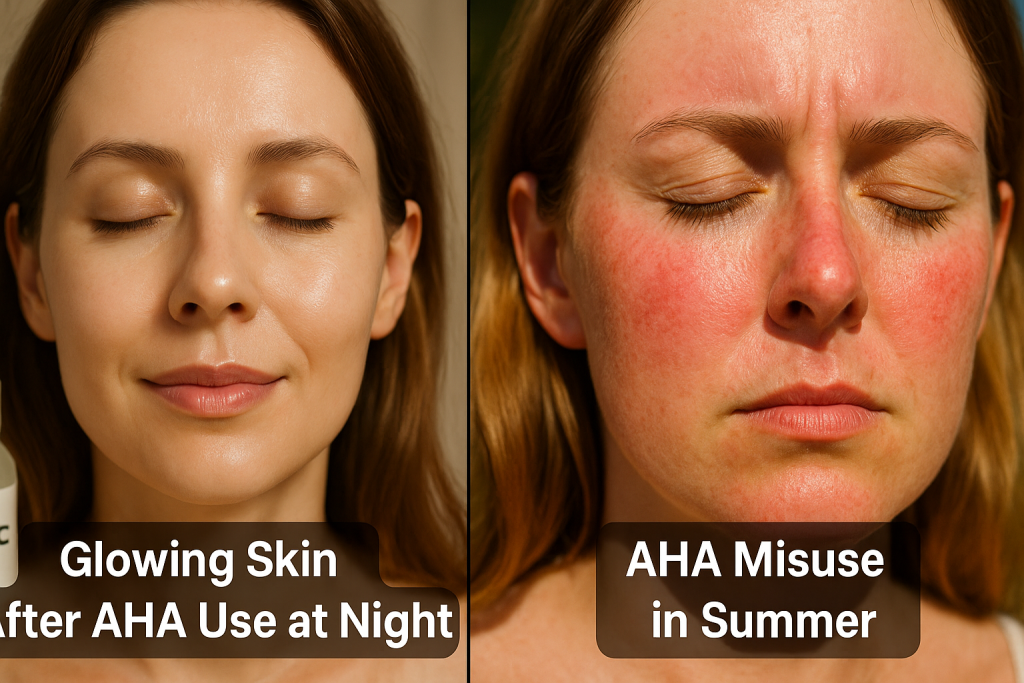
What Can Go Wrong with AHAs in Summer?
Frequent use of AHAs during sunny months can trigger dark spots, uneven skin tone, and severe sunburns. This effect is even more pronounced in those with darker skin tones, who may be prone to persistent hyperpigmentation.
Summer Skincare Tip
- Limit AHA use to once or twice a week, or pause until autumn.
- Opt for gentler exfoliation, such as a soft washcloth or enzymatic exfoliants from papaya or pumpkin.
- Never skip daily sunscreen when using any exfoliant.
3. Benzoyl Peroxide: Harsh on Acne, Harsher with Sun
How Benzoyl Peroxide Works
Benzoyl peroxide is a powerful ingredient in many acne treatments, known for its ability to kill acne-causing bacteria and clear pores. However, it is also highly drying and can make the skin more sensitive to sunlight.
Risks of Benzoyl Peroxide in Summer
Excessive dryness, redness, and flaking are common when using benzoyl peroxide, but these effects intensify in summer. Sun exposure can exacerbate irritation and even lead to chemical burns in some cases. The product may also bleach clothing or towels, which is problematic when sweating is more common.
Summer Skincare Tip
- Switch to salicylic acid or gentle sulfur-based spot treatments for acne control during summer.
- If you continue using benzoyl peroxide, use a lower concentration and always follow with sunscreen and a lightweight moisturizer.
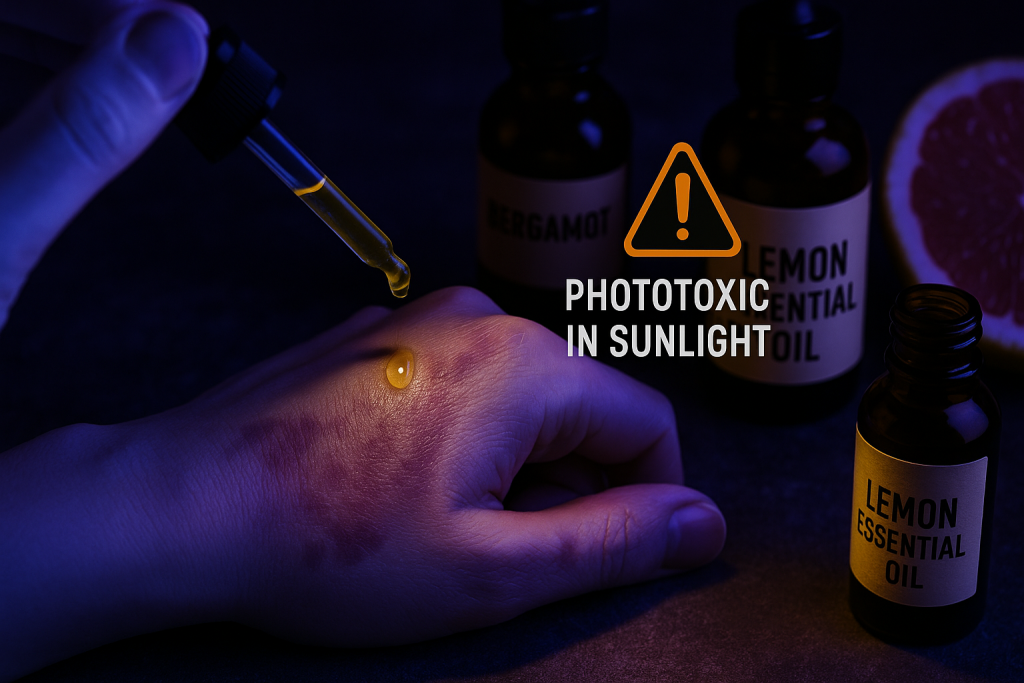
4. Essential Oils: Nature Isn’t Always Gentler
Phototoxic Essential Oils to Watch Out For
Some essential oils, especially those derived from citrus fruits like lemon, lime, bergamot, and grapefruit, can cause phototoxic reactions when exposed to UV rays. This can result in blistering, severe redness, or lingering dark patches on the skin.
Fragrance and Heat: A Bad Combination
Increased heat and humidity can amplify irritation from fragrant essential oils, leading to itchy rashes or allergic reactions. Some oils even disrupt your skin’s natural barrier, making it harder to retain moisture in summer’s drying conditions.
Summer Skincare Tip
- Avoid skincare products listing citrus oils or strong fragrances among the top ingredients.
- Choose unscented or hypoallergenic products to minimize your risk of irritation in summer.
5. Heavy Occlusives: Too Much Moisture Can Backfire
What Are Occlusives?
Occlusives such as petrolatum, mineral oil, and thick balms create a seal over the skin to prevent water loss. This is great in winter, but in summer, heavy occlusives can trap sweat and sebum, leading to breakouts, clogged pores, and a greasy feeling.
How They Impact Summer Skin
Wearing heavy occlusives in hot weather can also interfere with your body’s natural cooling process. Sweating under a thick layer of balm may cause milia (tiny white bumps), increased oiliness, or worsen acne-prone skin.
Summer Skincare Tip
- Switch to lightweight, gel-based moisturizers containing hyaluronic acid or glycerin.
- Reserve heavier creams for stubborn dry patches or use only at night if absolutely needed.
6. Alcohol-Based Products: Stripping Your Skin’s Defenses
Alcohol in Toners and Astringents
Many toners, astringents, and facial sprays use high concentrations of alcohol to provide a cooling, mattifying finish. While this can feel refreshing initially, alcohol strips your skin’s natural oils and damages its moisture barrier, which is especially problematic in summer when your skin is already battling dehydration.
Dangers of Alcohol in Summer
Prolonged use leads to dryness, inflammation, and increased oil production as your skin tries to compensate. This can set off a cycle of irritation and breakouts. Those with sensitive or sun-exposed skin are at even greater risk of redness and discomfort.
Summer Skincare Tip
- Replace alcohol-based products with hydrating mists or toners containing soothing ingredients like aloe, rose water, or cucumber extract.
- Look for “alcohol-free” or “hydrating” labels for summer-appropriate skincare.
7. Physical Exfoliants: Increased Risk of Microtears
The Problem with Scrubs
Physical exfoliants—face scrubs with nutshells, sugar, or rough beads—can lead to microtears in the skin’s surface. While exfoliating might feel satisfying after a sweaty day, summer skin is often more sensitive thanks to increased sun and heat exposure.
Why They’re Riskier in Summer
Using abrasive scrubs during this time can leave your skin raw and more permeable, making it even more susceptible to sunburn, rashes, and infection. Dermatologists recommend avoiding mechanical exfoliation, especially before outdoor activities.
Summer Skincare Tip
- Use gentle chemical exfoliants less frequently, or try enzyme-based masks as a safer option.
- Focus on thorough cleansing rather than scrubbing, especially after sweating or wearing sunscreen.
Bonus: Ingredients That Can Cause Sun Sensitivity
In addition to the main ingredients above, certain medications and botanical extracts—like St. John’s Wort, some prescription antibiotics, and even some cosmetics—can increase your susceptibility to sunburn. Always check labels and consult your dermatologist if you’re unsure.
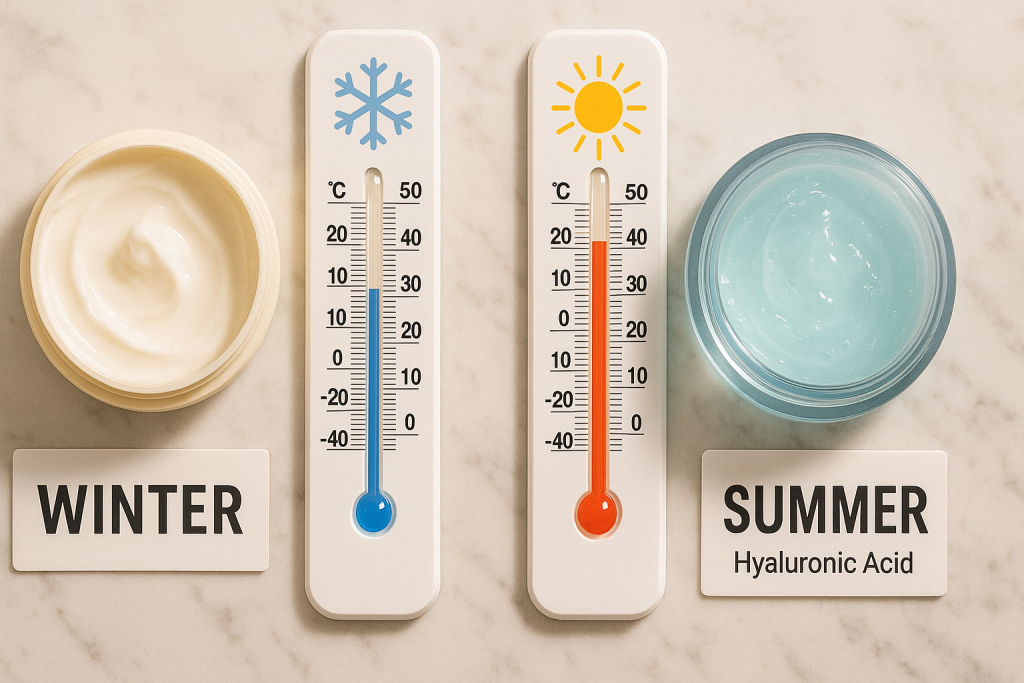
Safer, Effective Alternatives for Summer Skincare
Just because you’re avoiding certain ingredients doesn’t mean you have to sacrifice results. Here are some summer-friendly skincare ingredients that hydrate, protect, and renew your skin without the downsides:
- Niacinamide: Reduces redness, strengthens the skin barrier, and controls oil.
- Vitamin C: Brightens and protects against free radical damage.
- Hyaluronic Acid: Deeply hydrates without feeling heavy or greasy.
- Aloe Vera: Calms and soothes sun-exposed or irritated skin.
- Green Tea Extract: Adds antioxidant power to fight pollution and UV stress.
Expert Tips for Healthy Summer Skin
- Check your products’ ingredient lists and rotate to lighter, non-comedogenic formulas as the weather warms up.
- Apply sunscreen daily, even on cloudy days, and reapply every two hours if you’re outdoors.
- Double cleanse at night to remove sweat, sunscreen, and pollution.
- Stay hydrated from within by drinking plenty of water.
- Listen to your skin: If you notice irritation or breakouts, simplify your routine and focus on gentle care.
Conclusion: Protect Your Skin by Choosing Wisely
Choosing the right skincare ingredients is crucial for maintaining healthy, glowing skin throughout summer. By avoiding harsh, sensitizing, or heavy products and swapping in lighter, soothing alternatives, you can prevent discomfort, sun damage, and breakouts. Always remember, your skin’s needs change with the seasons, so your routine should too. Make these smart swaps and embrace your most radiant summer yet!
